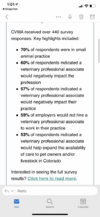- Joined
- Oct 20, 2013
- Messages
- 5,611
- Reaction score
- 3,990
Sounds similar to a physician's assistant (a role I never really understood the reasoning/need for, to be honest) - some of the perks of a doctor, but often without the same level of responsibility or years of schooling if I am correct in my understanding of a PA.Here it is... veterinary mid-levels. And they'll get even less training than a CVT/RVT/LVT... but can supposedly diagnose and do minor surgeries.
Welcome to the new vet med, where DVMs aren't hired as much and are replaced by the mid-levels but the cost remains the same and the DVMs that are hired have full clinical responsibility for the mid-levels. Good luck protecting your license.
Master of Veterinary Clinical Care
I'm honestly more concerned for finding care for my own pet now that I'm really not in clinical medicine. It'll turn into human medicine where you can't actually see a Dr anymore. Rather sad. This will put animals at risk and there will be many more medical deaths.
Coming from an ER perspective - I could see someone like this running the 'urgent care' portion of my ER that we are trying to establish. The things that make people like me roll my eyes when we get a triage call for them - itchy dogs, ear infections, non-complicated eye issues, kitten URIs, vomiting episode in an otherwise excessively BAR puppy, etc. Things that don't need a workup or serious assessment of labs/diagnostics, things that wait 6 hours to be seen because I got sicker pets to deal with. I mean, the last time I went to an urgent care, I didn't see a doctor.
At the same time, would someone who did this program want a job in ER? Where else would someone like this fit in? Honest questions - this program is starting up regardless. I don't see any info on their website stating 'A graduate of this program can fill x void in a practice....' for example. Perhaps the graduates of this program would fill the growing ER telemedicine niche? I truly have no idea. I just don't see a need for someone like this in general practice, but most of you would have better opinions on that than I do.
